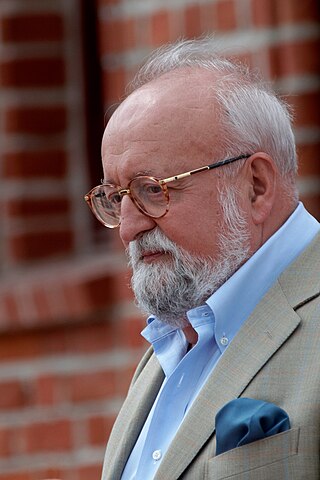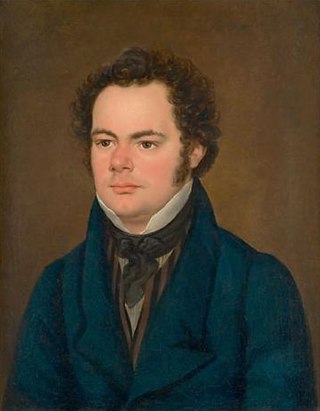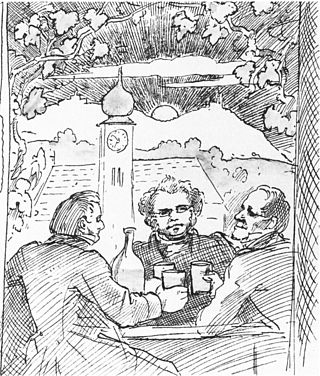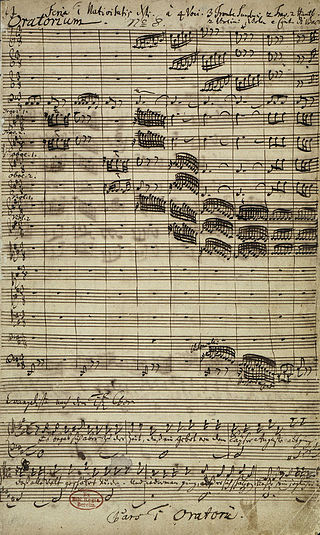The Bach-Werke-Verzeichnis is a catalogue of compositions by Johann Sebastian Bach. It was first published in 1950, edited by Wolfgang Schmieder. The catalogue's second edition appeared in 1990. An abbreviated version of that second edition, known as BWV2a, was published in 1998.

An die ferne Geliebte, Op. 98, is a composition by Ludwig van Beethoven written in April 1816, setting poetry by Alois Jeitteles.

The Symphony No. 8 "Lieder der Vergänglichkeit" by Krzysztof Penderecki is a choral symphony in twelve relatively short movements set to 19th and early 20th-century German poems. The work was completed and premiered in 2005. The symphony has an approximate duration of 35 minutes. Penderecki revised the symphony in 2007 by adding a few more poem settings and the piece has expanded to around 50 minutes. Although given the designation Symphony No. 8, it was not actually the final symphony Penderecki completed before his death in March 2020; the Sixth Symphony, begun in 2008, was not completed until 2017.

Im Frühling in G major is a Lied by Austrian composer Franz Schubert.

German rapper Fler has released 17 studio albums, four mixtapes, one EP, six collaborative albums and 59 singles.
Augustin Pfleger was a German Bohemian composer.
Ihr Häuser des Himmels, ihr scheinenden Lichter, BWV 193.1, is a secular cantata by Johann Sebastian Bach first performed on 3 August 1727. The music is lost, but it can be partially reconstructed as several movements are known to have shared music with Ihr Tore zu Zion, BWV 193.2, a church cantata which was premiered around three weeks after Ihr Häuser des Himmels, ihr scheinenden Lichter.
"I Lost My Heart in Heidelberg" is a German song composed in 1925 by Fred Raymond with lyrics by Fritz Löhner-Beda and Ernst Neubach. The song was an immediate popular hit, and in 1927 Raymond included it in a musical of the same name. Two films, released in 1926 and in 1952, take their titles from the song. It remains the theme song of Heidelberg. It was recorded in Britain by the duo Bob and Alf Pearson.
Franz Schubert's best-known music for the theatre is his incidental music for Rosamunde. Less successful were his many opera and Singspiel projects. On the other hand, some of his most popular Lieder, like "Gretchen am Spinnrade," were based on texts written for the theatre.

Franz Schubert's best known song cycles, like Die schöne Müllerin and Winterreise are based on separate poems with a common theme and narrative. Other song cycles are based on consecutive excerpts of the same literary work: Schubert's "Ave Maria" is part of such a song cycle based on excerpts of the same poem, in this case by Walter Scott.
Bach's first cantata cycle refers to the church cantatas Johann Sebastian Bach composed for the somewhat less than 60 occasions of the liturgical year of his first year as Thomaskantor in Leipzig which required concerted music. That year ran from the first Sunday after Trinity in 1723 to Trinity Sunday of the next year:

Die Freunde von Salamanka D. 326, is an 1815 Singspiel in two acts by Franz Schubert to a libretto by Johann Mayrhofer.

Jauchzet, frohlocket! Auf, preiset die Tage, BWV 248I, is a 1734 Christmas cantata by Johann Sebastian Bach that serves as the first part of his Christmas Oratorio. Bach was then Thomaskantor, responsible for church music at four churches in Leipzig, a position he had assumed in 1723. For the oratorio, the libretto by an unknown author followed the nativity of Jesus from the Gospel of Luke, interspersed with reflecting texts for recitatives and arias, and stanzas from Lutheran hymns.
This page is based on this
Wikipedia article Text is available under the
CC BY-SA 4.0 license; additional terms may apply.
Images, videos and audio are available under their respective licenses.






